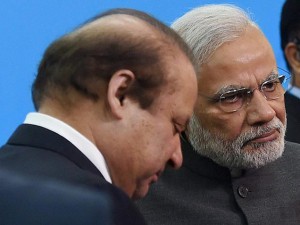‘Pakistan Uses Terrorism As Instrument of Statecraft’: India’s Strong Rebuttal at UN
 NEW YORK: Rejecting Pakistan Prime Minister Nawaz Sharif’s speech at the United Nations, India today accused him of misusing the global forum to “distort reality and portray a false picture of the challenges in our region.”
NEW YORK: Rejecting Pakistan Prime Minister Nawaz Sharif’s speech at the United Nations, India today accused him of misusing the global forum to “distort reality and portray a false picture of the challenges in our region.”
Exercising a Right of Reply, India said Mr Sharif’s portrayal of Pakistan as the “primary victim of terrorism” was inaccurate.
“The heart of the matter is a state that regards the use of terrorism as a legitimate instrument of statecraft. In a point-by-point reply to Pakistan Prime Minister Nawaz Sharif’s address at the U.N. General Assembly, India accused Pakistan of trying to “shift responsibility” for firing at the Line of Control.
“The world knows that the primary reason for firing is to provide cover to terrorists crossing the border. It needs no imagination to figure out which side initiates this exchange,” the statement, filed by the Permanent Mission of India to the United Nations in New York, said.
Officials had said that India’s response would come directly from External Affairs Minister Sushma Swaraj when she makes India’s address at the UNGA which is expected on Thursday at 10:30 p.m. IST.
Referring to Mr. Sharif’s statement on how Pakistan’s forces were fighting the terrorists that “killed its children”, India said, “Pakistan claims to be the primary victim of terrorism. In truth, it is actually a victim of its own policies of breeding and sponsoring terrorists.”
India took particular exception to Mr. Sharif’s reference to Kashmir as a land under “foreign occupation,” replying, “The occupier in question is Pakistan. In fact, India’s reservations about the proposed China-Pakistan Economic Corridor stem from the fact that it passes through Indian territory illegally occupied by Pakistan for many years.”
4-step peace plan
In a 15-minute address that made several references to Kashmir as a land under “foreign occupation”, Mr. Sharif said he had tried to “reach out” to India to resolve the issue.
He then proposed that India and Pakistan begin with ending the firing at the Line of Control, “formalise and respect” the 2003 ceasefire and ask the United Nations Military Observer Group in India and Pakistan to verify it. Mr. Sharif proposed a “no use of force” agreement. Finally, he proposed steps to “demilitarise Kashmir” and “mutually withdraw troops from the Siachen.”
India didn’t respond to Mr. Sharif’s peace proposals in its statement, but said that Pakistan must keep its commitment to the Simla Accord, and its 2004 declaration on stopping support to terrorism. “On each occasion, it is India that has extended the hand of friendship. India remains open even today to engage Pakistan on outstanding issues in an atmosphere free of terrorism and violence.”
The Pakistan Prime Minister’s speech at the U.N. was unusual, as his four-point pitch for peace was made to India on the world platform, where other countries are normally not addressed directly. However, it indicates the Pakistan government’s desire to show the international community that it is keen on resuming dialogue.
Mr. Sharif’s speech came at the end of a week when he and Prime Minister Narendra Modi stayed at the same hotel in New York, and even attended the same conference on peacekeeping.
Yet despite speculation that there would be some contact in order to pick up dialogue threads, there were no talks between them. On Monday, the leaders did manage a wave at each other across the U.N. meeting hall at the peacekeeping conference chaired by U.S. President Barack Obama.

